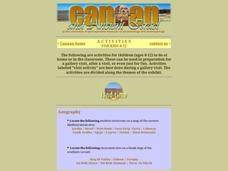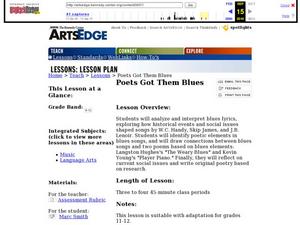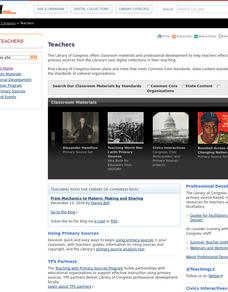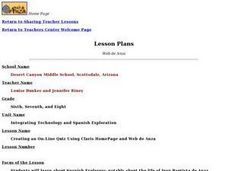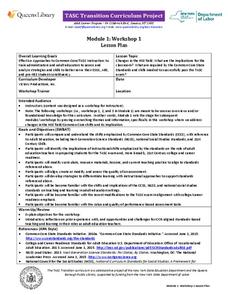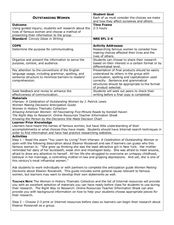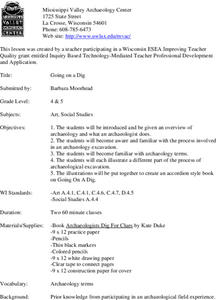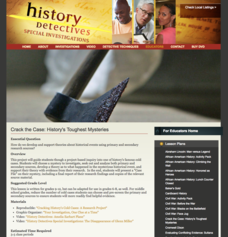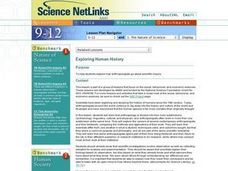University of Pennsylvania
Canaan and Ancient Israel
Planning for your next activity on ancient Israel, but not sure where to start? Check out this assortment of activities to help get the ball rolling. It includes a range of ideas on topics, such as Greek and Egyptian mythology,...
Curated OER
Poets Got Them Blues
Contemplate what music learners listen to and why they listen. Can they find poetry within music lyrics? Specifically hone in on blues lyrics and ruminate upon the social issues prevalent in the themes. Particular song lyrics coincide...
Curated OER
Holocaust Case Studies
Seventh graders become familiar with the events of the Holocaust. They research information on the Holocaust using the Internet, novels, and videos. Students present case studies involving the Holocaust to the class. They develop and...
Curated OER
When Work is Done
Eleventh graders create an album based on a thesis statement about life in the 20th century after completing the introductory instructional activity for a instructional activity on the web site "When Work is Done".
Curated OER
What can money tell us?
Learners study the physical presence, imagery and written text on a reproduction of colonial currency. They apply their research to a modern day quarter to compare and contrast two coins. In addition, they design their own colonial...
Curated OER
Technology and Spanish Exploration
Students examine the life of explorer, Juan Bautista de Anza. They create an on-line quiz based on their findings.
Edgate
Why Map a Map?
After brainstorming reasons why Native Americans mapped their lands, your young critical thinkers will work together to review their ideas and determine the definition of a map. With today's extensive use of mapping technology and GPS...
Eastconn
Women of the California Gold Rush
The California Gold Rush was not just an opportunity for the male gold miners sifting for shiny nuggets. Small groups read accounts of the ways women took advantage of the influx of workers to run hotels, bake pies, and wading out into...
Queen's Printer for Ontario
Evaluating Wartime Posters: Were They Good Propaganda?
"Back Him Up!" Scholars will analyze how World War I posters displayed, on the home front, often attempted to stir up emotions. As they examine the different ways people used propaganda posters during the war, they will create their own...
Curated OER
Ka'ianaa'ahu'ulu: A Leader of Hawai'i
Students evaluate leadership traits in 18th century Hawai'i and modern times. In this leadership skills lesson, students identify leadership traits and read the story of Ka’iana. Students monitor the leadership activities of a partner...
National Endowment for the Humanities
James Madison: Madison Was There
Madison was there! Scholars go on a journey to discover the person behind the founding father label as they explore James Madison's role in the formation of the United States government. The culmination is a writing assignment and...
Austin Independent School District
Visual Discovery Note Taking Sheets
Step into history and step out with a new understanding of events. These strategies bring a new level of understanding of key events by asking viewers to engage in and respond to projected images. Complete directions for the activity, a...
Federal Reserve Bank
FRED in the Classroom: Employment and the Labor Force
Acquaint your class members with data sources for employment in the United States and help them gain a better understanding of a vital measure of our economy's health.
New York State Education Department
TASC Transition Curriculum: Workshop 1
Work out your core, Common Core State Standards, through the first workshop in a series of 15 designed for educators. Inquiry-based activities designed for all content areas and grade levels explore the shifts to new standards,...
University of Wisconsin
Why Did the Triangle Fire Occur?
An investigation of the 1911 New York City Triangle Shirtwaist Factory fire leads class members to examine primary and secondary source materials related to the event and apply what they learn about the working conditions at the time to...
Curated OER
Outstanding Women
Research the lives of famous women in this social studies lesson. Middle schoolers use various sources to research a famous woman and create a presentation about the accomplishments of the woman. They can find the central idea throughout...
Curated OER
Inference By Analogy
Students infer the use or meaning of items recovered from a North Carolina Native American site based on 17th-century European settlers' accounts and illustration.
Curated OER
Shadows of North Carolina's Past
Students construct a timeline of four major culture periods in Native American history from studying archaeological evidence cards.
Curated OER
Effigy Mound Activity
Students research effigy mounds of Native people in Wisconsin. They create large models of effigy mounds in a given area based on factual information from their studies and research.
Curated OER
Going on a Dig
Learners study an overview of archaeology and what an archaeologist does. They examine the process involved in an archaeology excavation and illustrate a different part of the process of archaeological excavation.
PBS
Crack the Case: History's Toughest Mysteries
Young sleuths don their trench coats, tip their fedoras, and grab their notepads to investigate one of four famous unsolved mysteries. After examining multiple primary and secondary sources related to their cold case, they propose a...
Curated OER
Exploring Human History
Students study the four main subdivisions of anthropology and how they overlap. They explore the careers of several contemporary anthropologists and their fieldwork, comparing the methods and applications of their work.
Curated OER
Maurie Japarta Ryan, Oral History Analysis
Students research Australian History as it relates to the separation of Aboriginal and Torres Strait Islander children from their families. In this Maurie Japarta Ryan lesson, students apply specific skills pertaining to oral history...
Curated OER
Expansion and Reform: Applying the Declaration of Independence
Young scholars conduct inquiries and research-acquiring, organizing, analyzing, interpreting, evaluating, and communicating facts, themes, and general principles operating in American history. They use the Declaration of Independence to...


